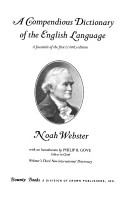Orthography Must be Balanced
The orthography of our language is extremely irregular; and many fruitless attempts have been made to reform it. The utility and expedience of such reform have been controverted, and both side of the question have been maintained with no inconsiderable zeal.
On this subject, as on most others which divide the opinions of men, parties seem to have erred by running into extremes. The friends of a reform maintain that our alphabet should be rendered perfectly regular, by rejecting superfluous characters, and introducing new ones to supply defects; so that every sound may be represented by a distinct letter, and no letter have more sounds than one. This scheme is impracticable, and not at all necessary.(1)
The opposers of a reform, on the other hand, contend that no alterations should be made in orthography, as they would not only occasion inconvenience, but tend to render old books useless, and obscure etymology. It is fortunate for the language and for those who use it, that this doctrin did not prevail in the reign of Henry the fourth; for it was as just then as it is now; and had all changes in spelling ceased at that period, what a spectacle of deformity would our language now exhibit! The doctrin is as mischievous in its consequences, as the reasons on which it is founded are false. Every man of common reading knows that a living language must necessarily suffer gradual changes in its current words, in the significations of many words, and in pronunciation. The unavoidable consequence then of fixing the orthography of a living language, is to destroy the the use of the alphabet. This effect has, in a degree, already taken place in our language; and letters, the most useful invention that ever blessed mankind, have lost and continue to lose a part of their value, by no longer being the representatives of the sounds originally annexed to them. Strange as it may seem the fact is undeniable, that the present doctrin that no change must be made in writing words, is destroying the benefits of an alphabet, and reducing our language to the barbarism of Chinese characters insted of letters. What is still stranger, this doctrin is pertinaciously maintained by the men who make pretenses to exquisit taste and refinement in polite literature. And if any thing can add to the contradictions which such a principle involves, it is that the same men, who object to the minutest alterations of orthography, are the most active in effecting changes of pronunciation; thus aiding to destroy the use of letters, by creating new differences between the written and spoken language.
The correct principle respecting changes in orthography seems to lie between these extremes of opinion. No great changes should ever be made at once, nor should any change be made which violates established principles, creates great inconvenience, or obliterates the radicals of the language. But gradual changes to accommodate the written to the spoken language, when they occasion none of these evils, and especially when they purify words from corruptions, improve the regular analogies of a language and illustrate etymology, are not only proper, but indispensable.
On this general principle have all learned and civilized nations proceeded in refining their languages and preserving the use of alphabetical writing. Hence we observe as great a difference between the orthography in the laws of Romulus, Servius Tullius and the Decemvirs, and that of Cicero and Livy, as between the orthography of Chaucer and that of Addison. This principle also prevailed universally in the English nation, from the revival of letters to the last century, when certain eminent authors adopted an idea, as absurd as incompatible with improvement, that a living language can be fixed beyond the possibility of change; and to the prevalence of this error, we may ascribe many of the irregularities of our present orthography.
From this error, or perhaps from a total inattention to the history of our language, has originated another mistake which now governs public opinion on this subject; this is, that the present state of our orthography exhibits the true etymology of words, and that every alteration would tend to obscure it.
Notes:
Folksonomies: spelling spelling reform orthography
Taxonomies:
/art and entertainment/books and literature (0.364670)
/science/social science/linguistics/translation (0.280110)
/business and industrial (0.204969)
Keywords:
orthography (0.911404 (negative:-0.016301)), language (0.844181 (negative:-0.133094)), Balanced The orthography (0.738814 (negative:-0.576409)), gradual changes (0.681569 (positive:0.302950)), principle respecting changes (0.673676 (positive:0.582458)), present orthography (0.655353 (negative:-0.669766)), certain eminent authors (0.646354 (neutral:0.000000)), inconsiderable zeal (0.553573 (neutral:0.000000)), fruitless attempts (0.543068 (negative:-0.618449)), obscure etymology (0.527423 (negative:-0.721781)), superfluous characters (0.521018 (negative:-0.305750)), reform maintain (0.518945 (positive:0.501467)), unavoidable consequence (0.516832 (neutral:0.000000)), old books (0.511987 (negative:-0.656306)), great inconvenience (0.509280 (neutral:0.000000)), distinct letter (0.507743 (neutral:0.000000)), common reading (0.506178 (neutral:0.000000)), polite literature (0.504221 (positive:0.417945)), new ones (0.503792 (neutral:0.000000)), general principle (0.503525 (positive:0.279362)), total inattention (0.503503 (negative:-0.735020)), Servius Tullius (0.503494 (neutral:0.000000)), current words (0.502954 (neutral:0.000000)), true etymology (0.502738 (neutral:0.000000)), minutest alterations (0.501986 (neutral:0.000000)), useful invention (0.500050 (positive:0.442015)), English nation (0.493277 (neutral:0.000000)), Chinese characters (0.492567 (negative:-0.399240)), present doctrin (0.487690 (neutral:0.000000)), regular analogies (0.487665 (neutral:0.000000))
Entities:
Servius Tullius:Person (0.719580 (neutral:0.000000)), Henry:Person (0.638285 (neutral:0.000000)), Livy:Person (0.626562 (neutral:0.000000)), Addison:City (0.626314 (neutral:0.000000)), Cicero:Person (0.596948 (neutral:0.000000))
Concepts:
Languages (0.945761): dbpedia
Alphabet (0.937737): dbpedia | freebase | opencyc
Orthography (0.935827): dbpedia | freebase
Word (0.879075): dbpedia | freebase
Linguistics (0.855808): dbpedia | freebase | opencyc
Writing (0.826319): dbpedia | freebase | opencyc
Present (0.742416): dbpedia | freebase | opencyc
Change (0.724909): dbpedia






